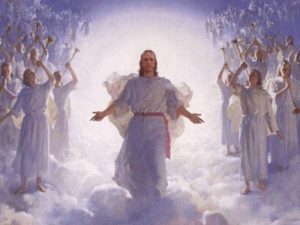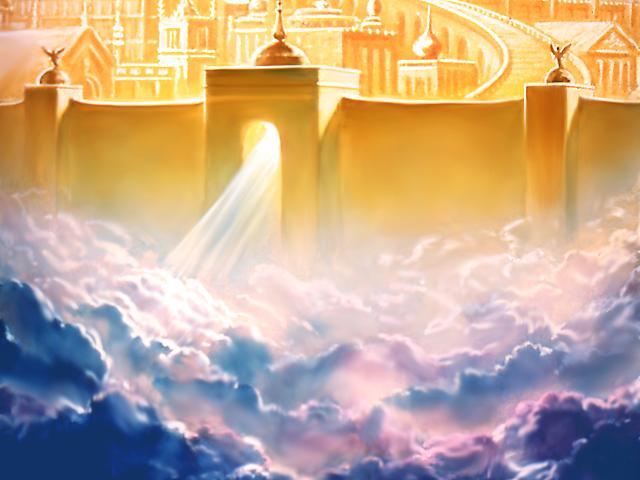For the last three months we’ve been trying to establish our relationship with the law and how it affects our discipleship with Jesus. I believe we’ve shown that the law is essential in providing the framework for God’s justice. How else can He judge sinners fairly, and do it in a compassionate way?
But what about the law in God’s eternal Kingdom? In a place where no sin or death is found, will there still be a place for the law? And how can we be sure that another Lucifer won’t arise to mar God’s glorious Heavenly Kingdom again?
Our full faith and trust in God are put on the line as we grapple with these troubling concerns this week. It isn’t easy to put our finite minds around an infinite God, but if we truly want to know Him, we will at least try. Someone has said that if God were small enough for us to understand, He wouldn’t be large enough to worship.
Let’s see what we can determine about God’s character, as we prepare to join Him someday in the Heavenly Home He’s preparing for us.
Key Text: “‘But this is the covenant that I will make with the house of Israel after those days, says the Lord: I will put My law in their minds, and write it on their hearts; and I will be their God, and they shall be My people'” Jeremiah 31:33 NKJV
This verse may come under the heading, “the restoration of Israel”, but how do we know it’s talking about heaven, and not a nation here on earth? The next verse, v. 34, helps us see this place as our future home, Christ’s future Kingdom in Heaven and the New Earth:
“No more shall every man teach his neighbor, and every man his brother, saying, ‘Know the Lord,’ for they all shall know Me, from the least of them to the greatest of them, says the Lord. For I will forgive their iniquity, and their sin I will remember no more.” NKJV
Only in our eternal home can we relinquish our role as teachers of salvation, for every inhabitant there will already be saved! Hallelujah!!! The law will be in our hearts, as a part of our being. We won’t even have to think about obedience, because Satan and his temptations are a thing of the past.
Let’s find out all we can about this glorious place.
Sunday: The Kingdom of God
God’s original purpose was for man to hold sovereinty on the earth. Adam and Eve were the first “royal” couple on this newly-formed planet. However, when they violated God’s law, Satan stepped in to claim sovereinty and ownership in their place. See Genesis 1:26 (“…Let us make man in our image…and let him have dominion over…all the earth…”).
There is Biblical evidence for Satan’s taking over this dominion:
- Ephesians 2:2 (“the prince of the power of the air”)
- II Corinthians 4:4 (“the god of this world”)
- John 12:31 (“the prince of this world”)
- Matthew 4:8, 9 (Satan offered Jesus “the kingdoms of this world” in exchange for Jesus bowing down to him)
Satan himself stated plainly in Luke 4:5-7 in this wilderness temptation to Jesus: “All power will I give thee, and the glory of them: for that is delivered unto me; and to whomsoever I will I give it.”
Think about what a powerful temptation this would be for Jesus. After all, His purpose for coming to earth was to win it back. And here Satan offered it to Him without having to suffer the cross.
Discussion Questions: What would have been the result if Jesus had not stood firm in all the temptations He experienced in the wilderness?
What role does God’s law have in our fight against Satan?
Monday: Citizens of the Kingdom
If Satan is sovereign of our planet, then what kind of citizens are those who profess Christ as their Redeemer?
- I Peter 2:11 “…I beseech you as strangers and pilgrims, abstain from fleshly lusts…” KJV
- Hebrews 11:13 “…embraced them, and confessed that they were strangers and pilgrims on the earth.” KJV
The reason why we feel like strangers here is because Jesus has told us:
“No man can serve two masters: for either he will hate the one, and love the other; or else he will hold to the one, and despise the other. Ye cannot serve God and mammon [wealth].” KJV
Evidently there are some countries in the world who allow you to hold dual citizenship. In other words, you can pledge allegiance to both places. But this is not the way God operates. The very first commandment (thou shalt have no other gods before me), tells us that God expects us to worship Him and Him alone.
As a matter of fact, those who hold citizenship in the Heavenly Kingdom will be diligent in following all the laws that God has laid down. Even though they find themselves in a foreign land, this wayward planet.
Discussion Questions: Foreigners often stand out when they find themselves in a strange, new country. How do Christians, in particular Seventh-day Adventist Christians, “stand out” as well? See Revelation 14:12.
How can we live as “strangers and pilgrims” here and still be the “salt of the earth”, impacting our world in a positive way? In other words, how can we contribute to our communities and yet be “not of this world” (John 17:14)?
Tuesday: Faith and the Law
The main theme in Scripture is not faith, and it’s not the law. The fact that God is love reverberates on every page of the Bible. He has not left anything undone when it comes to rescuing this sinful world from the clutches of Satan. This was demonstrated most clearly when Jesus paid the ultimate price for our redemption, His own life, for ours, on the cross.
This God of love will not force anyone into His Kingdom either who doesn’t desperately want to be there. People are given ample opportunities to choose their destiny. Those who are condemned in the final judgment are condemned by their own testimony. Their lives and hearts reveal who has their allegiance.
The wicked “are shut out [of heaven] by their own unfitness for its companionship. The glory of God would be to them a consuming fire. They would welcome destruction that they might be hidden from the face of Him who died to redeem them.” Steps to Christ, p. 18
Discussion Questions: Read I Corinthians 6:9-11 and Revelation 22:14, 15 and notice the sins of the unrighteous. They are fornicators, idolators, adulterers, homosexuals, thieves, covetous, drunkards, sorcerers, murderers, violent and dishonest people. Although we’ve been taught to hate sin and love the sinner, why are sinners mentioned here, instead of the sins they commit?
According to Romans 3:28, “Therefore we conclude that a man is justified by faith without the deeds of the law.”We clearly see that justification, when God declares us just and not guilty, is a gift from God, and doesn’t depend on our works at all. But is sanctification, which involves becoming holy by adhering to God’s moral law, also a gift? In what way? [I Corinthians 6:11 says, “…but ye are washed, but ye are sanctified…by the Spirit of our God.” Doesn’t this mean that sanctification is also a gift from God? We can’t do it on our own?]
Wednesday: The Everlasting Kingdom
This everlasting kingdom is described quite well by Daniel:
“And the kingdom and dominion, and the greatness of the kingdom under the whole heaven, shall be given to the people of the saints of the most High, whose kingdom is an everlasting kingdom, and all dominions shall serve and obey him.” Daniel 7:27 KJV
Notice that the inhabitants of this everlasting kingdom all serve and obey God. In fact they choose the path of service and obedience when they chose to follow Him here on earth. In a sense, the saints begin to practice their heavenly lifestyle the moment they commit themselves to God. Their love to God is demonstrated by their faithful, obedient lives.
Discussion Questions: Given the fact that a moral, loving universe can’t exist unless its citizens are free to choose, how can we be sure that sin will not arise again when God’s people are rescued and taken to heaven after the Second Coming? Will we still have our power of choice in the everlasting Kingdom?
Read Jeremiah 31:31-34 and see that God not only wants to write His law on our hearts now, but that the whole universe will serve Him because they naturally want to do things that are pleasing to God. If God can forget about sin there (“…and I will remember their sin no more.” v. 34), does this indicate that we too can forget about it there and not worry about it rising up again in heaven and the new earth?
Thursday: The Law in the Kingdom
The first, last, and harshest consequence of sin has always been death. Only two people that we know of from our world have escaped it: Enoch and Elijah.
I’ve often wondered why they were chosen to leave this earth in such miraculous fashions. It’s thought that Moses is also in heaven now, after a special resurrection following his death (Moses and Elijah were seen on the Mount of Transfiguration with Jesus–Matthew 17). We find in several places that in a judicial proceeding, two or three witnesses are needed. Perhaps these godly men were chosen as those witnesses. 
Hebrews 12:1 mentions also “a cloud of witnesses”. We usually think of a cloud as referring to heavenly angels (compare Revelation 1:7 and Matthew 16:27). So the whole universe is undoubtedly witnessing the controversy between good and evil, and will be able to testify in defense of God on that great Judgment Day.
God and His law are on trial there. It’s not just about us, folks. This trial can and will come out as God has promised. God will triumph in the end. There need be no question in the minds of His followers. His everlasting Kingdom will be secure against sin throughout eternity.
Discussion Question: How do we know that God’s law will still be in effect when we get to heaven? How easy or difficult will it be to obey the law there, as compared to here on earth?
Summary
“God will establish a new and eternal world where all the results of the violation of God’s law will no longer exist. Each of us is called to accept the offer of citizenship in God’s kingdom.” ~the quarterly’s teacher’s edition
Challenge
- Consider the perfect environment waiting for us in heaven.
- Is there anything in your life today that would not fit comfortably in that heavenly home?
- Ask God for how you can prepare to live with angels.
Next Week: Beginning a new Quarter–“The Teachings of Jesus”
To read the Sabbath School lesson or for additional resources, see www.ssnet.org








